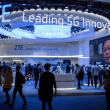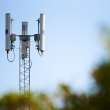T-Mobile’s CEO explains the company’s new private 5G strategy
T-Mobile on Monday took the wraps off its new private wireless networking offerings, and the company’s CEO spoke about it at length during an investor event.
“CIOs everywhere are interested in this topic right now,” T-Mobile’s Mike Sievert said Monday at the J.P. Morgan Global Technology, Media and Communications Conference. “And they’re interested in it for a reason. They want more secure networks, they want dedicated [network] capacity, they want dedicated spectrum, which means they understand the throughput. They want service level commitments, and they want it all as-a-service. And we’re able to provide that in a unique way.”
Ultimately, Sievert said, T-Mobile’s new private networking offering is designed to help the company increase its market share among business users from around 10% today to around 20% by 2025.
In a series of releases Monday morning, T-Mobile outlined its private wireless networking strategy – housed in its new 5G Advanced Network Solutions (ANS) division – with vendors including Ericsson, Nokia and Dell Technologies. Ericsson and Nokia will supply networking equipment for the private networks (they already supply 5G equipment for T-Mobile’s public network). Dell, meantime, will supply edge computing equipment, including its “VxRail hyperconverged infrastructure,” so that T-Mobile’s enterprise customers can store and process their data locally, such as in large business campuses, factories or universities.
T-Mobile’s private wireless strategy revolves around three basic options:
- Public Network, which is “architected so that data travels less distance from the device to the compute resource and back,” according to the operator.
- Hybrid Mobile Network, which T-Mobile said “is ideal for things like immersive VR training, computer vision and inspections and other demanding applications, without the expense of a fully private solution.”
- Private Mobile Network, which is “needed for only the most demanding applications, like industrial automation in a factory or fully autonomous robots,” T-Mobile said.
To read the complete article, visit Light Reading.

















